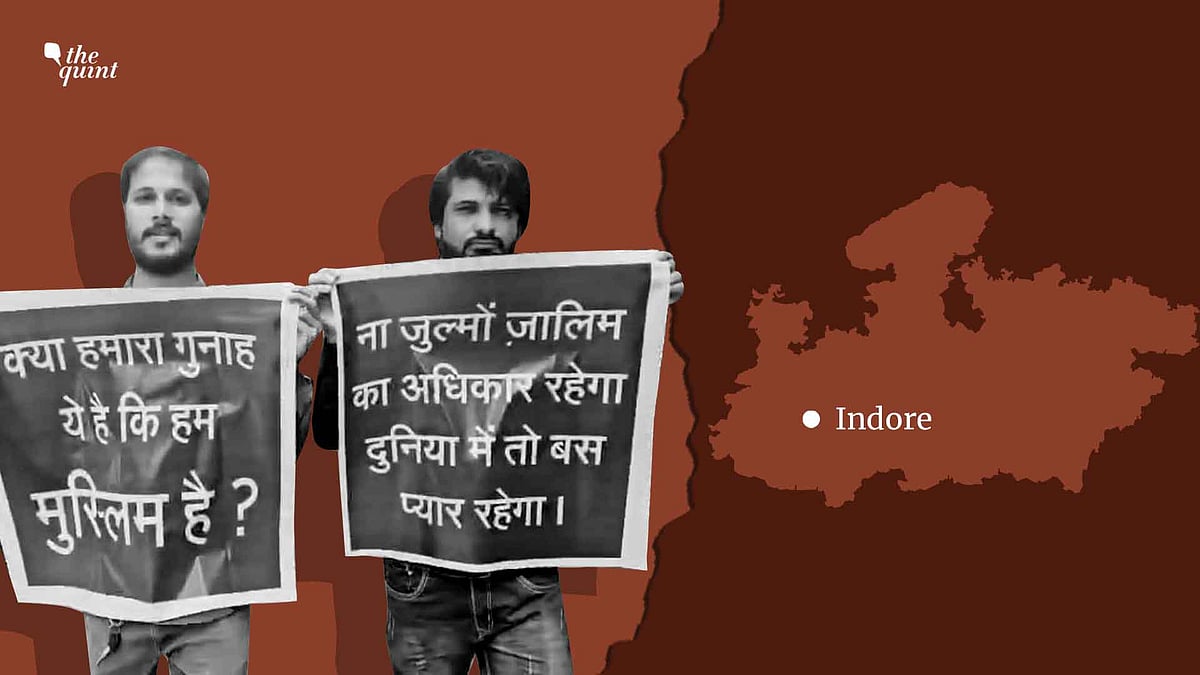‘Nobody Should Rent...’: Right-Wing Diktat Evicts Muslim Shopkeepers in Indore
Some Hindu shopkeepers staged a demonstration against the order by chanting slogans for Hindu-Muslim unity.

advertisement
A month-long campaign in Indore by Hind Rakshak Sangathan chief Aklavya Singh Gaud, who is also the district vice president of the Bharatiya Janata Party (BJP), has resulted in the dismissal of more than 60 Muslim workers and the exit of several Muslim shopkeepers from the Sheetla Mata market in the city.
The move, justified by Gaud and his supporters as a crackdown on so-called “love jihad,” has stoked communal tensions in Madhya Pradesh’s commercial capital and raised troubling questions about the erosion of constitutional rights and values. Gaud's right-wing fringe outlet was also behind accusing stand-up comedian Munawar Faruqui for allegedly hurting religious sentiments in 2021.
In late August, Gaud allegedly issued a diktat to shopkeepers in Sheetla Mata market, asking them to remove Muslim employees by 25 September.
Gaud, son of three-time BJP MLA Malini Gaud, denied setting a formal deadline, but admitted to raising the issue.
“All the shopkeepers held a meeting and were unanimous in their decision. It was not my diktat. It was the traders’ call and a collective decision,” he told The Quint. Yet, his influence over the market association and political ambitions in Indore’s “Char Number” Vidhan Sabha seat are widely seen as the driving force behind the campaign.
Gaud's father Laxman Gaud was a former cabinet minister and known for his hardcore Hindu leader image. He died in a road accident a few years ago.
The Sheetla Mata Bazaar Vyapari Association openly backed the decision. The association's president Hema Panjwani defended the expulsion of Muslim workers.
Her words underscore the shift from an isolated controversy to what may become a broader campaign targeting Muslim traders across Indore.
Livelihoods Lost to Communal Hate
For those affected, the impact has been devastating. Mohammad Harun, 55, who ran a garment shop in the market for years, said his landlord asked him to vacate under pressure.
At least half a dozen other Muslim shopkeepers have vacated their establishments since the diktat. For over 60 workers, the diktat has meant sudden unemployment with no clarity on what comes next.
"We came here only to work, to feed our families. We are targeted because we are Muslims," said an evicted Muslim shopkeeper, requesting anonymity.
Congress corporator Rubina Iqbal Khan, from the Khajrana area, said the intimidation extended beyond Sheetla Mata market. She pointed to a Navratri fair in the Kankeshwari temple area where a Muslim man operating a jhoola (swing) was allegedly forced out. “This shows the extent to which the hate campaign has spread,” she said.
Positioning for Power
The incident is unfolding against a backdrop of political manoeuvring in Indore. The “Char Number” seat, held by MLA Malini Gaud, is considered a bastion of the Gaud family. In the 2023 Assembly polls, Malini was renominated despite her son Aklavya's lobbying for the ticket.
The battle for the seat has intensified further, with Indore Mayor Pushyamitra Bhargava also emerging as a contender. A BJP leader, on the condition of anonymity, said “The mayor has been actively carrying out development works in the constituency and is believed to be eyeing the ticket as well.”
In 2021, after Aklavya Gaud stirred a row by accusing Munawar Faruqui of "mocking" Hindu deities, the comedian was arrested, and later granted bail, but the case remains a flashpoint in debates over free speech and intolerance.
Constitutional Values Under Strain
Some Hindu shopkeepers opposed the eviction by staging a demonstration against it, holding placards and chanting slogans for Hindu-Muslim unity.
Balwant Singh, a 40-year-old shopkeeper, who was asked to vacate along with his Muslim business partner Haroon, said, “Hum dono partner hain, do bhai hain hum, dono ki dukan ka ye bola gaya hai ki Mohmmedian ki dukan khali kiya jaye.... Kisi ke pet se, na kisi ke saath khilwad kiya jaye... (We are business partners, like brothers. Both our shops have been told to evict because one of us is a Muslim. No one’s livelihood should be played with, no one should be treated unfairly.)
Singh said he was considering moving court, if the matter was not resolved.
When pressed on the constitutional angle of dismissing workers based on religion, Gaud reportedly sidestepped the question, saying: “We will talk about constitutionality later.”
Former chief minister and Congress leader Digvijaya Singh visited the market on 27 September, met those impacted, and later went to the Sarafa police station to lodge a complaint.
When the The Quint approached district collector Shivam Verma, he said, "We will take cognisance and initiate strict action against those involved in case we receive any complaint."
Markets Mirror Rising Intolerance
While some Hindu shopkeepers had come out in support, some argued that the move was necessary to “protect Hindu daughters." Others worried that communal polarisation could spiral further, hurting Indore’s reputation as a thriving commercial hub.
The developments in Sheetla Mata market are not isolated. Analysts note a worrying trend across parts of Madhya Pradesh where socio-economic exclusion of minorities is gaining ground under the banner of “love jihad” or “cultural purity.”
As state politics heats up, the controversy is likely to intensify. With Aklavya Gaud’s ambitions clashing with other local politicians and the Congress raising the issue of constitutional violations, the episode could evolve into a wider debate over identity politics and governance in Madhya Pradesh.
For now, the livelihoods lost remain a stark reminder of the real human cost. The question is no longer just about one market in Indore—it is about the survival of India’s constitutional promise of equality in the face of mounting communal pressures.
(The author is a senior journalist based in Madhya Pradesh.)